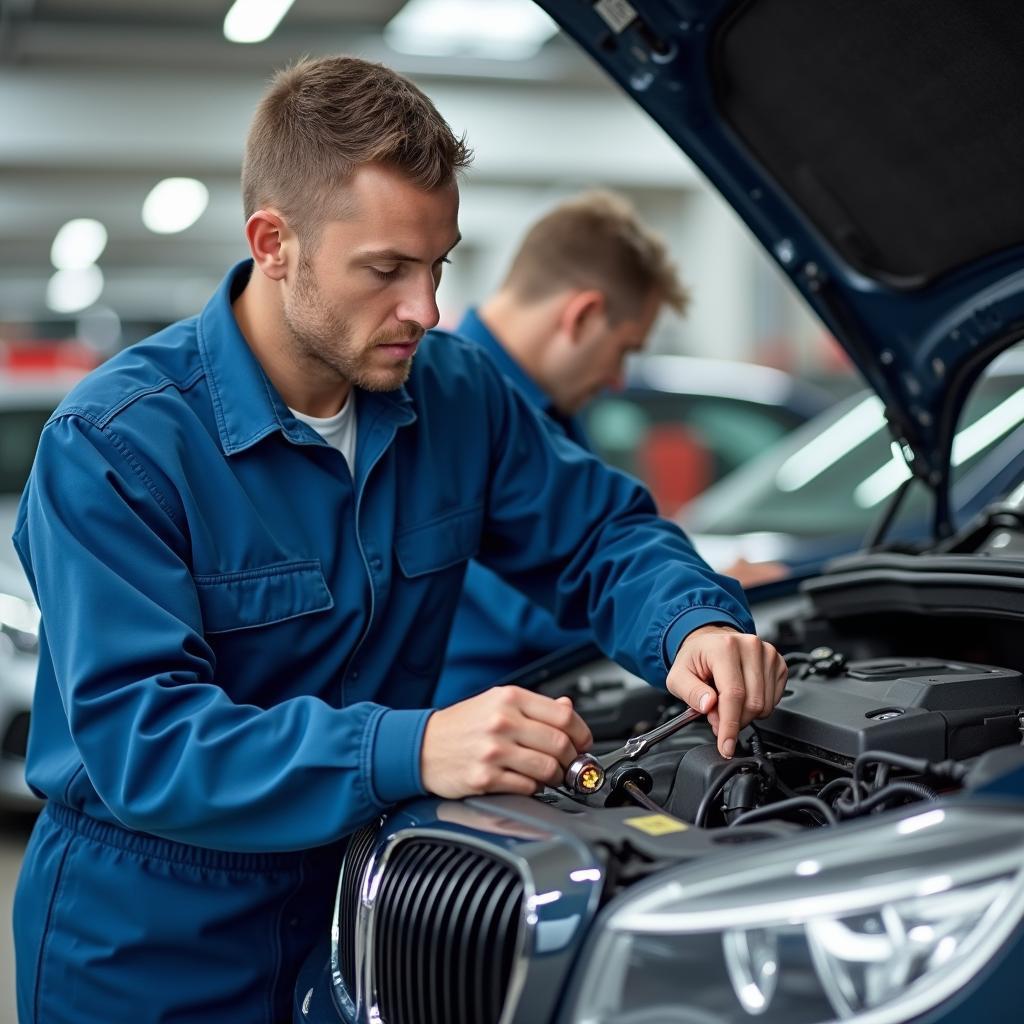Car servicing. It’s one of those things that every car owner knows they need to do, but the specifics can feel shrouded in mystery. What actually goes into it? And what do you need to make sure your car is running smoothly?
This guide will demystify the process, providing you with all the information you need to confidently approach your next car service.
Essential Car Service Components
Whether you’re a DIY enthusiast or prefer to leave it to the professionals, understanding the basic components of a car service can help you make informed decisions about your vehicle’s maintenance.
Here’s a breakdown of the essential areas covered in a standard car service:
- Oil and Filter Change: The lifeblood of your engine, oil needs to be replaced regularly to prevent a buildup of sludge and debris. The oil filter works in tandem, trapping contaminants and ensuring clean oil circulates through the engine.
- Fluid Level Check and Top-Up: Your car relies on a variety of fluids to function correctly. This includes coolant, brake fluid, power steering fluid, transmission fluid, and windshield washer fluid. A service will check levels and top them up as needed.
- Tire Inspection and Pressure Check: Properly inflated tires are crucial for safety, fuel efficiency, and tire longevity. During a service, mechanics will inspect your tires for wear and tear and ensure they’re inflated to the correct pressure.
- Brake Inspection: Your brakes are your car’s most important safety feature. A mechanic will inspect your brake pads, rotors, calipers, and lines for wear and tear and recommend replacements as needed.
- Battery Test: Your car battery provides the power to start your engine and run various electrical components. A battery test will assess its health and alert you to any potential issues.
- Air Filter Replacement: The air filter ensures clean air reaches your engine for efficient combustion. A dirty air filter can restrict airflow, impacting performance and fuel economy.
- Spark Plug Check: Spark plugs ignite the air-fuel mixture in your engine’s cylinders. Worn spark plugs can cause misfires, reduced power, and poor fuel economy.
- Belts and Hoses Inspection: Your engine relies on various belts and hoses to function correctly. These can deteriorate over time, so a mechanic will inspect them for cracks, leaks, or wear.
Beyond the Basics: Additional Service Considerations
While the elements listed above form the foundation of a standard car service, there are additional factors to consider depending on your car’s make, model, age, and driving conditions.
- Mileage-Based Service: Your car manufacturer outlines recommended service intervals based on mileage. These services may include more comprehensive inspections or replacements of specific parts.
- Timing Belt/Chain Replacement: The timing belt or chain synchronizes your engine’s valves and pistons. Failure can lead to catastrophic engine damage, so replacement at the manufacturer’s recommended interval is vital.
- Fuel System Cleaning: Over time, deposits can accumulate in your fuel system, impacting performance. A fuel system cleaning can help remove these deposits and restore efficiency.
- Transmission Service: Your transmission is responsible for shifting gears. A transmission service typically involves fluid and filter changes and can help prevent costly repairs.
- Coolant Flush: Over time, coolant can degrade and lose its effectiveness. A coolant flush replaces old coolant with fresh fluid, protecting your engine from overheating.
Choosing the Right Car Service Provider
Selecting a reputable and trustworthy car service provider is essential. Consider these factors when making your choice:
- Certifications and Experience: Look for mechanics certified by reputable organizations like the ASE (National Institute for Automotive Service Excellence). Experience with your car’s specific make and model is also beneficial.
- Customer Reviews: Online reviews and testimonials can provide insights into other customers’ experiences.
- Transparency and Communication: Choose a provider who clearly explains the services they’ll be performing, provides upfront pricing, and communicates any issues or recommendations effectively.
- Warranty: Reputable service providers often offer warranties on their work, giving you peace of mind.
 Car service center with a mechanic working on a car.
Car service center with a mechanic working on a car.
FAQs: What You Need to Know
Q: How often should I service my car?
A: Refer to your car’s owner’s manual for specific recommendations. As a general rule, most manufacturers suggest a service every 6 months or 5,000-7,500 miles.
Q: What’s the difference between a minor and major service?
A: A minor service typically includes basic checks, oil change, and filter replacements. A major service is more comprehensive and includes additional inspections, fluid flushes, and may involve replacing wear-and-tear parts.
Q: Can I service my car myself?
A: If you’re mechanically inclined, you can perform basic maintenance tasks yourself. However, more complex procedures are best left to qualified mechanics.
Q: What happens if I don’t service my car regularly?
A: Neglecting car service can lead to reduced performance, decreased fuel efficiency, and increased risk of breakdowns. It can also void your car’s warranty.
Keeping Your Car in Top Condition
Regular car servicing is essential for maintaining the performance, reliability, and safety of your vehicle. By understanding the key components of a car service and choosing a trustworthy provider, you can ensure your car stays in optimal condition for years to come.

